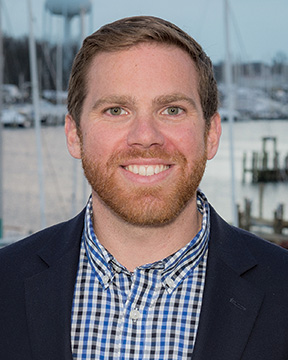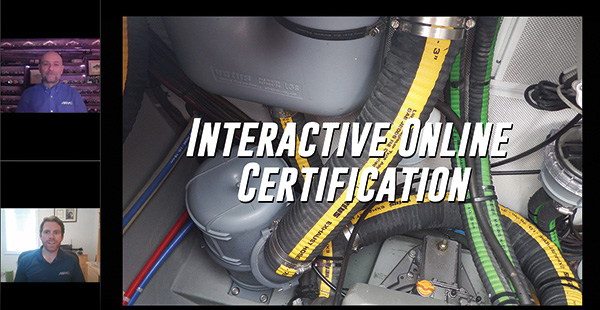Digital teacher: Workforce training continues despite pandemic

By Adam Quandt
From dealers to manufacturers, filling the ranks for the marine industry workforce has been a large issue facing everyone for some time. Despite the ongoing COVID-19 pandemic, the recreational boating industry — especially dealers — is still looking to add skilled technicians to teams across the board.
The key component to getting skilled labor into the industry? Education. But in a world with limited in-person contact or in some cases complete shutdowns, how do you ready the next generation of workforce?
Those leading education efforts have migrated to online education, almost entirely.
Following the mass closures across the country due to the sweeping coronavirus pandemic, the American Boat & Yacht Council shifted it’s technical training courses to online experiences.
“I think we adapted fairly quickly here,” ABYC education director David Broadbent said. “We had the right team in place and quickly put together the right strategic plan to continue moving forward.”
From the get go, Broadbent and the team at ABYC had one main goal; ensure the industry and those pursuing training in marine service that the organization was still completely committed to educating new marine technicians.
As shutdowns across the country continued, ABYC launched a free weekly webinars digging into popular topics around boat service. The webinars take more of a technical approach to the topics, rather than focus on COVID-19-related issues.
“Our initial intention with the webinars was to only hold them for a few weeks, until things started back up,” Broadbent said. “As weeks went on and things didn’t change, we made the decision to continue with them.”

Now in their 10th week, the webinars have been met with high attendance and rave reviews, according to Broadbent. Following the weekly webinar, the recording version is made available to anyone via ABYC’s YouTube channel, where the webinars continue to rack up views.
“The webinars have been received better than we could’ve even imagined,” Broadbent said. “For many of the webinars we’ve had between 12,000 and 13,000 participants. We definitely plan to continue the webinars well after the pandemic has subsided.”
Similarly, ABYC also moved its certification courses — usually held during in-person training events — to an online-only platform due to the pandemic, after cancelling all of its in-person events for the remainder of 2020.
“Our decision to cancel in-person classes for the foreseeable future was necessary for the health and safety of our members,” Broadbent said. “Fortunately we were able to quickly and successfully transition our courses to an interactive online format utilizing the same instruction material a student would see in our traditional classrooms, including live Q&A.”

Since launching the online certification courses, ABYC has continued the trend of sold out classes, despite the new delivery method.
As of the end of May, ABYC had 90 participants in three online certification courses, with an 88% pass rate (up from the 73% pass rate seen with the in-person courses).
Along with an increased pass rate, the online courses brought another silver lining to ABYC certification, global reach. The first online marine electrical course brought in students from a multitude of countries including the U.S., Canada, Martinique, Australia, Bahamas, Brazil, Mauritius and South Africa.
“We’ve had people asking for years across the globe to do international classes. And with ABYC standards becoming more globally accepted, we want to be able to reach those anywhere in the world looking for training,” Broadbent said. “We have even scheduled a class early in the morning Eastern time in order to be more accessible for the European market.”
The online classes follow a new format, with courses for an hour and a half each day and taking place over three weeks. Broadbent said that the new format allows much more time for students to study, work, or whatever else they might need, while taking the course.
Broadbent mentioned that online certification courses offer another benefit, by removing travel costs and an extended time off from a student’s job.
“Really, with all of the benefits we’re finding, this isn’t going to a model that goes away for us,” Broadbent added.
As a resource to those online learners, in mid April, ABYC announced a partnership with Active Interest Media to provide free web access to ABYC’s textbook, Fundamentals of Marine Service Technology.
The Northwest Career and Technical Academy (NCTA), located in Anacortes, Wash., is one school taking advantage of the free resource. In Washington state, all school districts were mandated to be physically closed for the remainder of the academic year but continue to provide instruction for the remaining 10 weeks.
“Our program is intensely project-based learning,” said Wes Fridell, NCTA marine services instructor. “With no way of providing at-school, hands-on learning, ABYC’s Fundamentals textbook takes on a significant role to focus students. Making it available online – and at no cost – has just made my lesson planning that much more robust. I can’t thank ABYC and AIM enough for making this a reality. It’s a crazy world right now and having a touch of normalcy for students to work with is priceless.”
Chapters in the textbook range from general shop safety and practices, to marine electrical system theory, servicing boat trailers, and maintenance and troubleshooting for outboards, gas, and diesel inboards. The textbook also features QR codes with access to online teaching videos. The hardback book is regularly priced at $149 and is affiliated with a larger curriculum and instructor materials available for purchase through ABYC.
Similar to ABYC’s shift to online platforms for certification work, larger scale conferences aimed at training workforce have also begun to shift to online-only events to keep the marine workforce up to date and safe.
In late May, the National Marine Electronics Association (NMEA) made the decision to shift its annual conference and expo as a virtual, online training event.
The virtual training event is scheduled for Sept. 22-24, 2020.
“Safety of our members and getting their businesses back on track is our number one priority as we look into the summer and fall,” said Mark Reedenauer, NMEA’s President and Executive Director. “Many of our members have suffered financial loses during the Pandemic, and we do not want to burden them with a decision of attending a conference in person.”
Overall, it seems despite the continuing pandemic, education and training across the marine industry for a new wave of workforce has not slowed. Trainers and organizations continue to adapt and provide future technicians with the knowledge they need to succeed, in the safest way possible for all involved.
“Everything we’ve gone through has been very encouraging. We knew digital would be important, but for the industry to adapt and use it so well, so quickly is great to see,” Broadbent said. “We haven’t seen a slow down on the education side at all. We’ve maybe even seen more getting involved if anything.”




